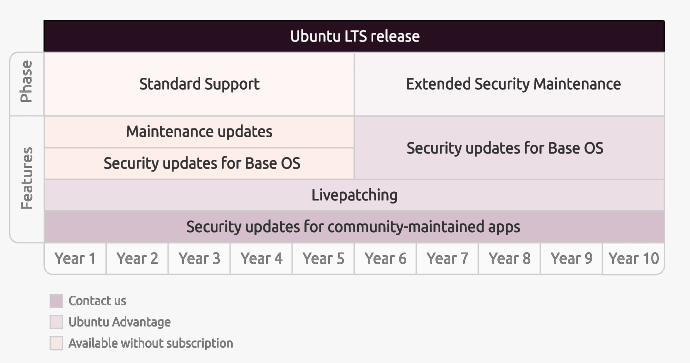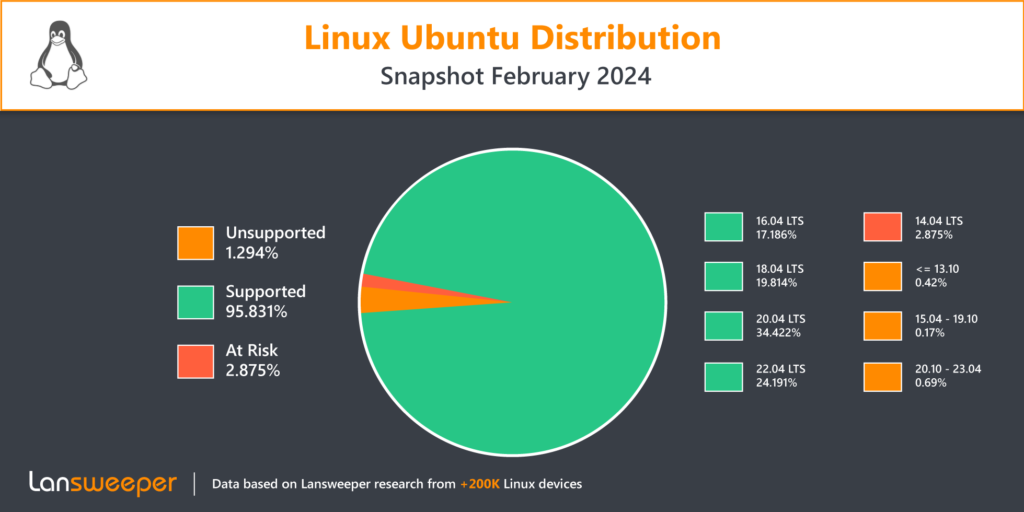
Version 14.04.X LTS of the popular Linux distribution Ubuntu will be going end of life in April 2024. Once EOL this version will no longer receive any security fixes or support. To ensure that you keep having access to maximum security and the latest features, make sure to update to a higher version.
What is Ubuntu Linux?
Initially released in 2004, Ubuntu is a Linux distribution primarily based on Debian and has a desktop, server, core, IoT, and robot edition. Aside from regular releases, the majority of users use an LTS version of Ubuntu. The main benefit of Ubuntu is that it has its own software repositories. Due to its wide usage, it is one of the most supported Linux operating systems out there.
Ubuntu Lifecycle
Ubuntu has two different types of releases, “Long Term Support” (LTS) and interim releases. An LTS version is released every two years in April. In between the two years, there are interim releases every 6 months. While Interim versions are only supported for 9 months, LTS versions are supported for 10 years.
Interim releases introduce new capabilities from both the Canonical and upstream open-source projects. These releases are frequently used for their newer compilers or access to newer kernels and libraries. The LTS releases are provided with security updates and kernel patches for the full 10-year lifespan.
For even longer support, Extended Security Maintenance (ESM) is available for purchase. You can find a full overview of all releases and their support dates on the Ubuntu wiki.

Because of the limited lifespan of the interim releases, most users opt for the LTS versions of Ubuntu with their 10 years of support. Lansweeper data from February 2024 looking at over 200,000 Linux devices shows that over 95% of users are using supported versions of Ubuntu. Only 2.875% are still using the soon-to-be EOL version 14.04 LTS and are thus at risk of going EOL soon.
All unsupported instances of Ubuntu that we found are of the short-lived interim versions. These interim releases give users access to new capabilities from canonical and upstream open-source projects. However, since they are only supported for 9 months, users have to be more proactive to upgrade to newer versions in time.

Ubuntu 14.04.X LTS End-of-Life
Ubuntu version 14.04.X LTS “Trusty Tahr” will go end-of-life in April 2024. To remain supported, you will need to update to a higher version. The latest interim release Ubuntu 23.04 (Lunar Lobster) will be supported until January 2024. The latest LTS release, 22.04 “Jammy Jellyfish”, will have you covered until April of 2032. Ubuntu 22.04.4 LTS comes with a host of new features including but not limited to:
- Multiple optimized kernels on a per-product basis
- Systemd v249.11
- OpenSSL 3.0
- Plocate replacing mlocate as the default
locateimplementation - Security improvements
Ubuntu 22.10 End-of-Life
Ubuntu version 22.10 “Kinetic Kudu” will go end-of-life in July 2023. In order to remain supported, update to a higher version or an LTS version. The latest interim release Ubuntu 23.04 (Lunar Lobster) will be supported until January 2024. The latest LTS release, 22.04 “Jammy Jellyfish”, will have you covered until April of 2032. Ubuntu 23.04 comes with a host of new features including but not limited to:
- The new 6.2 Linux kernel
- Multiple toolchain upgrades
- A new installer for Ubuntu Desktop
- New features and fixes from the latest GNOME release, GNOME 44
Ubuntu Linux Audit Report
Lansweeper retrieves detailed operating system info from all your devices. The report below will give you an overview of all your Ubuntu Linux devices along with the Ubuntu version it is running, the end-of-life date, and even how many days are remaining. That way you have an actionable list of devices that need to be updated.



